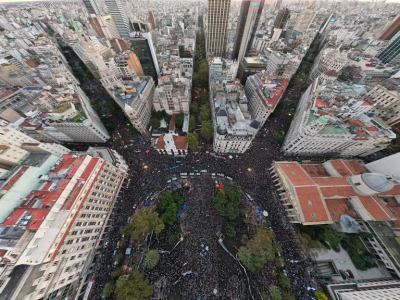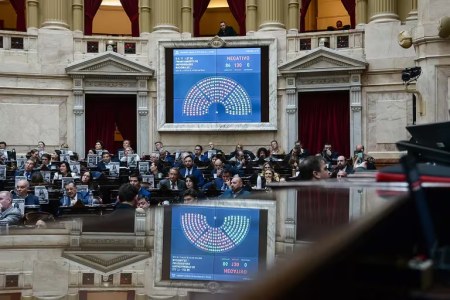All the Answers
Well-known member
Universities: with a tight number, the radical deputies could give Milei a new victory - Infobae

Source:

Universidades: con un número ajustado, los diputados radicales podrían darle un nuevo triunfo a Milei
El Presidente dijo que vetará la ley de Financiamiento. En la UCR hay 4 de los 5 ausentes que si repiten el accionar en la sesión de movilidad jubilatoria votarían con el oficialismo
September 23, 2024
The President said that he will veto the Financing Law. In the UCR there are 4 of the 5 absentees who, if they repeat the action in the retirement mobility session, would vote with the ruling party
By David Cayon

The massive march in April
The national government received on Thursday night the text of the University Budget Law, approved by the Senate of the Nation on September 13. The Executive now has ten working days to veto it, otherwise it will automatically become law. The deadline expires on October 3, one day after the mobilization that national universities throughout the country are organizing.
“The veto will be total,” they say at the Casa Rosada when asked about it. “We don’t care about the demonstration,” they add, referring to whether a march similar to the one at the end of April could influence the decision.
In the midst of this panorama, and while the 2025 Budget is being discussed, which foresees the sending of $3.8 billion to national universities, almost half of the budget estimated by the National Interuniversity Council , the National Congress is debating the possibility of insisting on the law, especially within the radical sphere.

Vote in favour of a larger university budget in the House of Representatives
“If they veto it, we will insist and everyone will be responsible for what they vote for. If they turn around on this, there will be nothing left of radicalism,” explained a UCR deputy , visibly disappointed and angry with several of her colleagues. “There is a chance of achieving it, but even if we don’t get there, we have to do it anyway,” he added when asked if the number of votes is enough.
On August 15, the Chamber of Deputies approved the law with 143 votes in favor, 77 against and one abstention. In that list, it can be seen that 35 legislators were absent, and it is in that group that each sector will seek the necessary votes to prevail. “There were many absentees who in principle would vote in favor of the insistence. We have to see how they veto and how the radicals behave,” said a deputy from Unión por la Patria .
Among those who could vote in favor of insisting on the law, 15 deputies from the Union for the Fatherland , five from the Federal Encounter and three from the Civic Coalition were absent . If all of them were present, the number of votes to insist on the law would reach 169.

The President at the meeting with radical deputies Martín Arjol, Luis Picat, José Federico Tournier, Mariano Campero and Pablo Cervi
On the side of the block that supports the veto, there were four PRO deputies absent, one from La Libertad Avanza , another from the Independencia block (the Peronists from Tucumán) and one from Producción y Trabajo . In total, they would add up to 84 votes.
The key is once again in the Radical Civic Union , which, as in the case of the retirement mobility law, is the block that authored the project. On the day of the vote, the block had four absences and one abstention. Among those absent from the UCR are Mariano Campero and Luis Picat, two of those who changed their vote on the retirement law. In the case of Campero from Tucumán, there seems to be no turning back: he was the only one who attended the barbecue in Olivos and brought a wine so as “not to come away empty-handed.” For his part, Picat reiterated that his limit is to vote with Kirchnerism, which would confirm his definitive move to the sector that supports the veto.
The third in doubt among the absent radicals is Gerardo Cipollini from Chaco , who, along with Roxana Reyes , will be investigated by the Ethics Tribunal of the UCR for being absent from the vote on the insistence on the retirement mobility. The fourth absent radical is also from Chaco, Juan Carlos Polini , who, if he appears, will vote in favor of the insistence, given that he considers that the five who voted against the mobility “have no turning back.”

Milei's barbecue at Quinta de Olivos with the deputies who supported the veto on retirement mobility
Finally, there is the only abstention of that day, led by the Mendoza native Lisandro Nieri , former Minister of Economy of Mendoza and close to the radical governor Alfredo Cornejo . It is unlikely that he will change his position regarding the insistence.
In this scenario, if all 257 members of the House are present and the voting scheme of insistence on retirements is repeated, the Radical Civic Union could add four votes to maintain the veto, reaching 88, while the opposition would add 169, which would represent another legislative victory for La Libertad Avanza .
“One always hopes that people will reflect, then each one will know what to do. The truth is that there is very little political and institutional quality, and most likely they – the libertarian radicals – will be there because it is what they want and what they aspire to. The truth is that if we lose universities, we lose something that is absolutely identifiable. Many of us come from the Franja Morada – the university branch of the party – and we are going to defend the public university,” concluded a radical legislator who, these days, is looking for votes for insistence.

